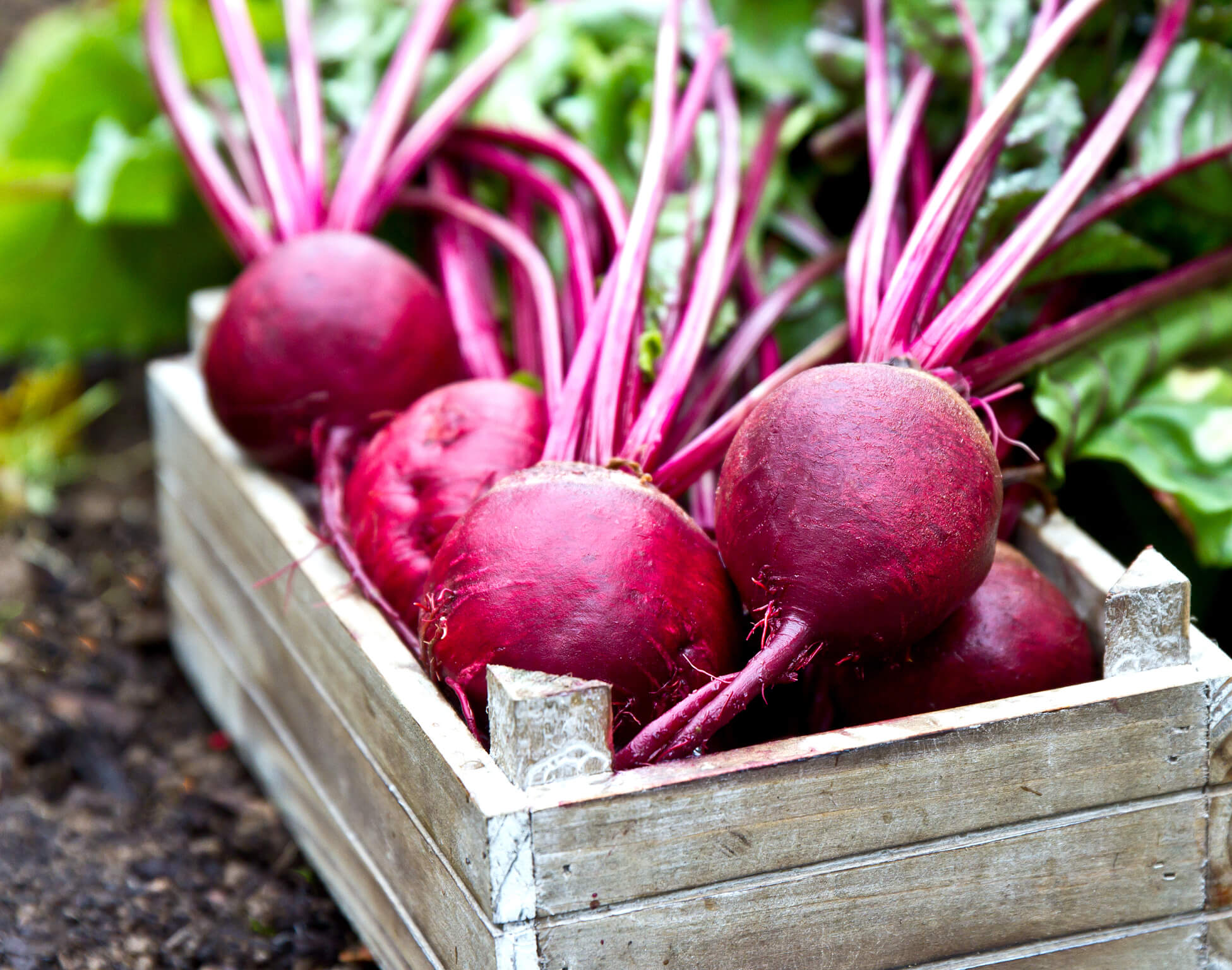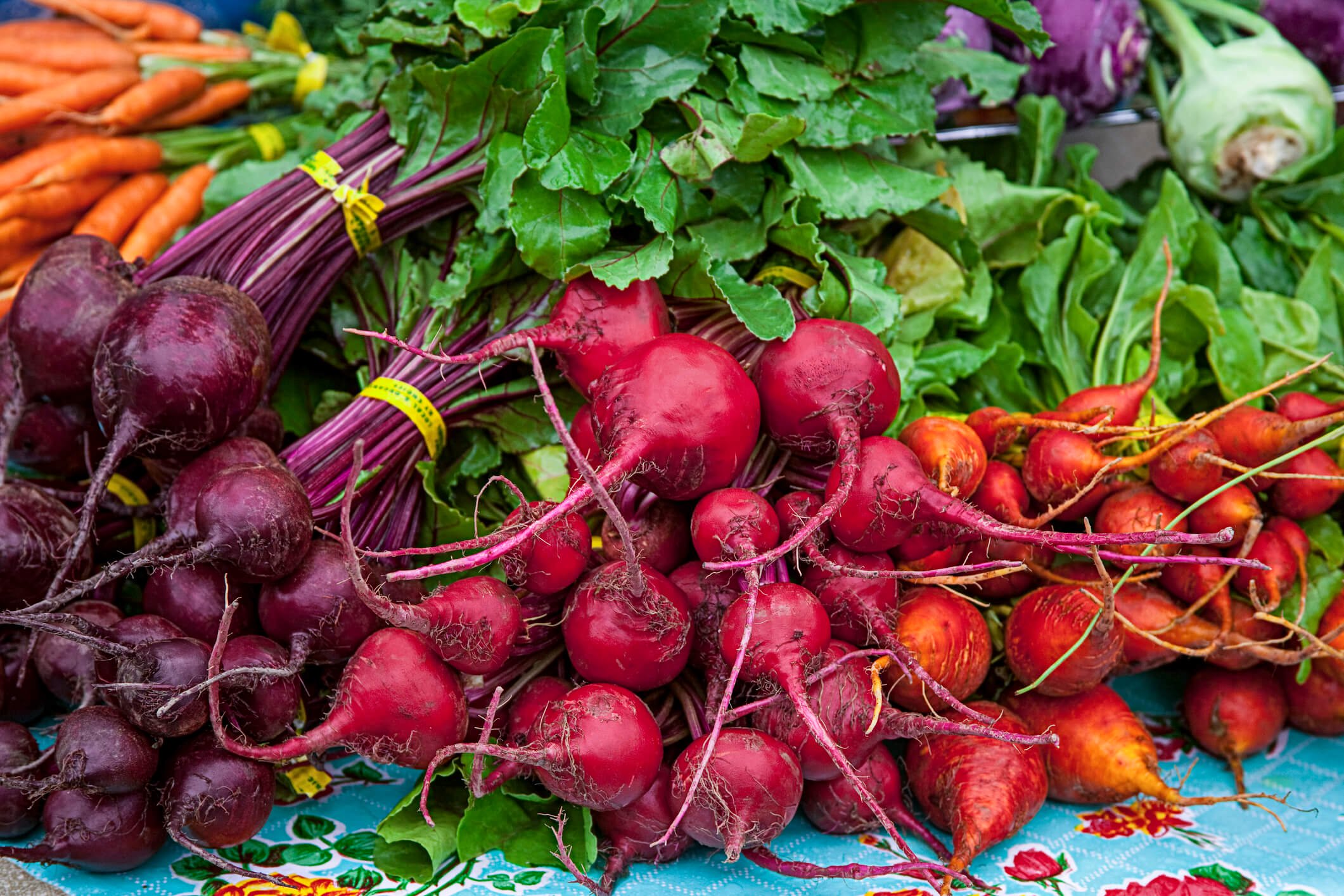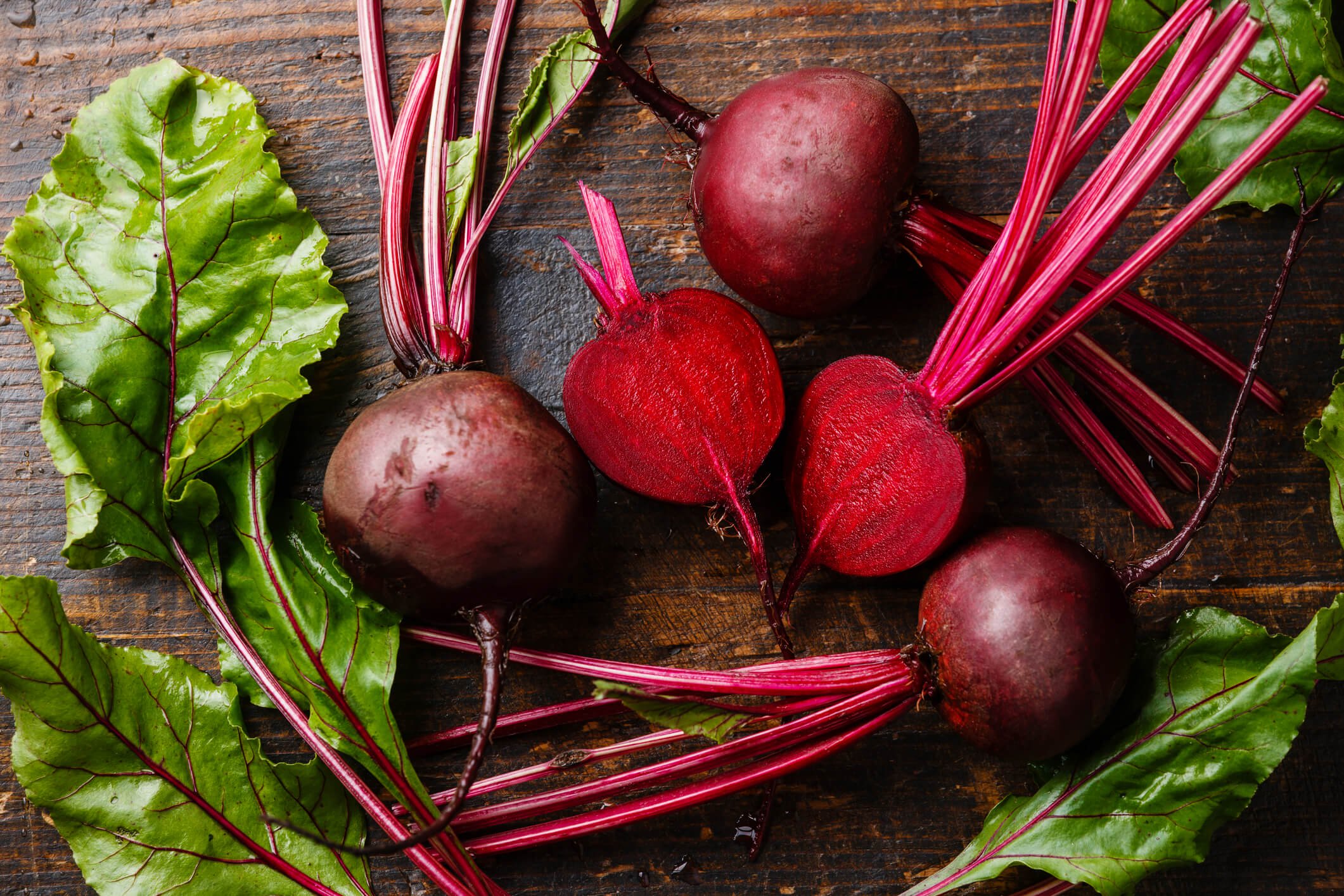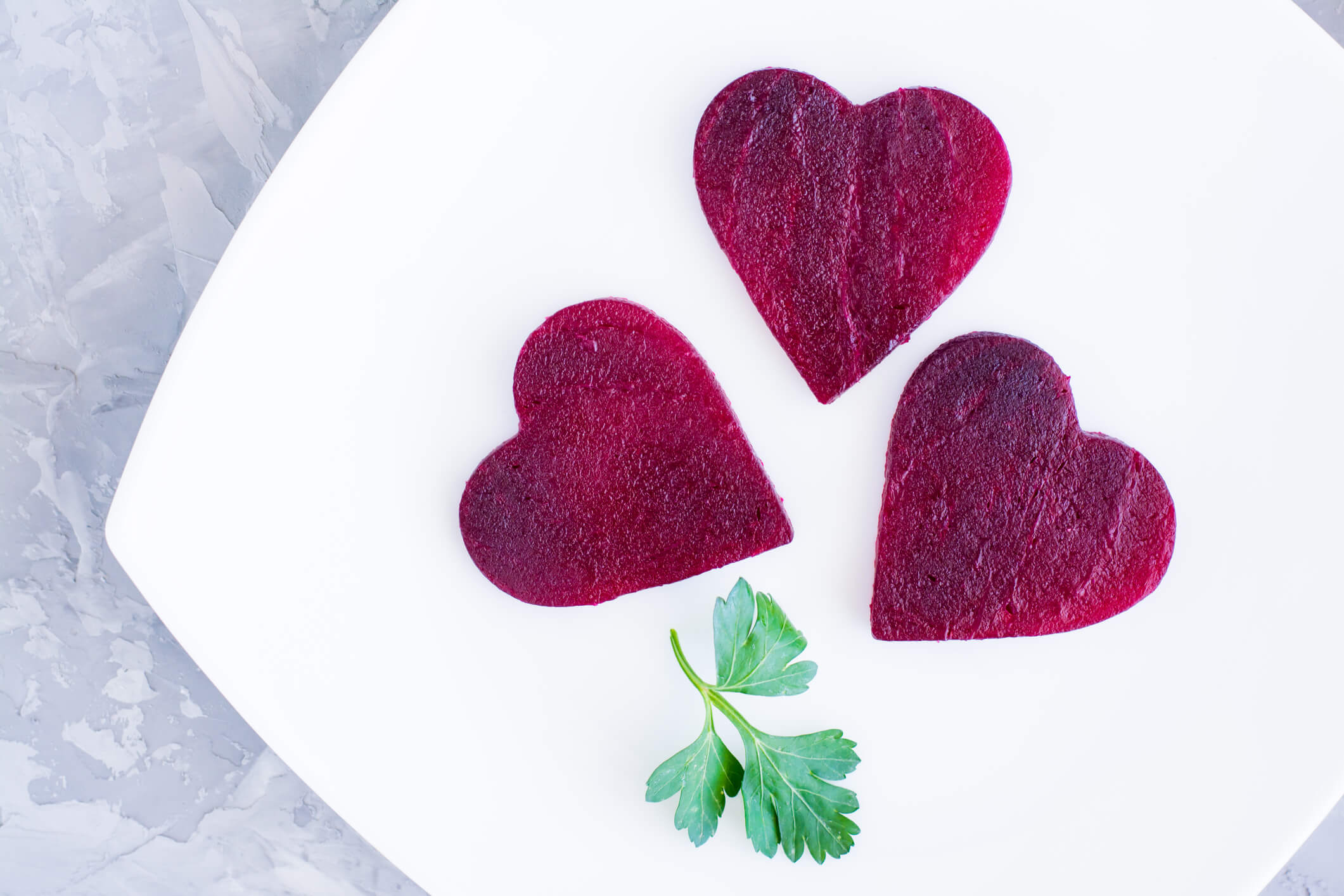10 Healthy Reasons to Brighten Your Meals with Beets
When it comes to beets, opinions are fiercely divided. Some people love them, and others loathe them. Depending on who you ask, beets taste like dirt or like candy.
Beet-o-phobia isn’t as common as negative reactions to foods like cilantro or black licorice (a Google search for “hate the taste of b-” returns beer, bone broth, baking soda, butter, and blood but not beets). But it’s still pretty widespread. And so is passion for this extraordinary, sweet root.
I want to share with you some amazing properties of beets. If you’ve ruled them out, perhaps you’ll even give them a second chance.
What are the benefits of beets? And what are the best ways to prepare them? And can I write an entire article about them without resorting to at least one terrible pun? (Spoiler alert: Nope.)
Meet the Beet — A Beautifully Colored Root Vegetable

Known scientifically as Beta vulgaris, beets are a root vegetable that slightly resemble turnips or rutabagas. They typically have a rough outer skin that covers their root, which is attached to their long green stem and leaves.
Early evidence shows that beet greens were used for food, while the roots had medicinal uses. However, Hippocrates recommended using the greens to heal wounds.
Using beets for sugar — now done using sugar beets — began in 18th century Germany with a chemist named Andreas Margraff.
If you’ve ever handled beets, you’re familiar with their ability to stain everything they touch (here’s how to clean that). This made them perfect for cosmetic uses during the 1800s. And it’s how the saying “red as a beet” originated.
Today, beet pigment is a natural alternative to commercial food colorings for use in things like plant-based burgers, tomato paste, wine, candy, and jams.
Beet the Rainbow

iStock.com/KeithSzafranski
Best known for their deep red (almost purple) color, beets actually come in several shades.
Most stores stock red beets, so you may have to go to the farmer’s market or specialty foods store to find these less common types.
Chioggia: Also called Candy Cane beets, Chioggia beets are red on the outside and red and white striped on the inside. These are heirloom beets with a distinct sweetness.
Golden: Golden beets are yellow-orange and have a more neutral taste. They also have the advantage of not bleeding when cooked.
White: They may have a very mild taste and look like turnips from the outside, but white beets are still in the family.
Formanova: These beets stand out from the others at almost eight inches long! They’re cylindrical in shape, resemblant of a sweet potato in size.
Lutz Green Leaf: This variety can be up to four times the size of other round beets — about six inches in diameter. Also called “winter keeper” beets, these are known for their long shelf life. Note that they become less sweet the larger they grow — a common tradeoff in root vegetables.
GMO Sugar Beets Are a Whole Different Beast
Conventional beets grown to eat are not genetically modified.
But “sugar beets” are a specific variety that contain a high concentration of sucrose and are used specifically for refined sugar production. In fact, more than half of all sugar used in the United States comes from sugar beets.
Nearly all the commercially cultivated sugar beets are “Roundup Ready.” This means they have been genetically engineered to be resistant to glyphosate, the main active ingredient in the highly controversial pesticide, Roundup.
Roundup is an endocrine disruptor, an antibiotic, and a probable carcinogen. It’s sprayed heavily on Roundup Ready sugar beets. If you want to avoid GMOs and glyphosate, that’s a good reason to choose only cane sugar — or better yet, avoid added sugar altogether.
But this is only an issue with beet sugar — not with “table beets” that you or I might buy in a store or grow in the backyard.
Beets Nutrition Facts

iStock.com/Lisovskaya
Beetroots are especially high in folate, manganese, and copper.
Folate is essential for DNA synthesis and preventing neural tube defects in babies. It’s also been shown to reduce risk for heart disease, cancer, and depression.
Manganese is needed for enzymatic processes in your body, as well as for metabolism, wound healing, and healthy bones.
Copper keeps your immune system healthy, helps create red blood cells, and supports energy production.
Beet greens are full of vitamins A, C, K, and B2.
Red beets get their rich pigment from phytonutrients called betalains. The two most well-known betalains are vulgaxanthin and betanin, which have antioxidant, cancer-fighting, and anti-inflammatory properties.
10 Health Benefits of Beets

iStock.com/Elena Rui
Beets have some amazing benefits for you:
Benefits of Beets #1 — They Are Good for Your Heart
Did you hear about the guy who stopped eating his veggies? His heart missed a beet. (OK, there’s that pun I promised. Now I can relax and get back to work.)
Beets, along with spinach, carrots, and cabbage, are a great source of nitrates.
Nitrates are compounds that convert to nitric oxide in the body. Nitric oxide opens up your blood vessels, which helps lower blood pressure and heart rate.
Think nitrates aren’t good for you? Don’t confuse the nitrates in beets with the nitrates and nitrites added to processed foods, like deli meat, which can form cancer-causing nitrosamines. Plants that naturally contain nitrates, like beets, also contain vitamin C and other compounds that prevent them from becoming nitrosamines.
In a 2014 study published in Hypertension, researchers found that drinking one cup of beetroot juice daily for four weeks was able to reduce blood pressure.
Some participants were even able to reduce some types of blood pressure medication as a result. The overall function of blood vessels was also improved.
Benefits of Beets #2 — They Can Make You a Better Athlete
The nitrates in beets improve blood flow, which helps move oxygen throughout your body.
Endurance athletes often drink beetroot juice to improve performance, which has got to be one of the healthiest and most delicious forms of doping ever invented. Better oxygen flow means that the athlete’s heart and lungs don’t have to work so hard during exercise, allowing them to perform vigorous activity for longer.
Beets can also increase time-to-exhaustion in athletes. In other words, drinking beet juice before exercise seems to prevent fatigue. Beet juice also prevents muscles from exhausting. It’s not clear whether this is because muscle damage lessens or because repair is enhanced, but either way, the results are positive.
Studies suggest that beetroot juice should be consumed within 90 minutes of starting athletics for the best outcomes.
Benefits of Beets #3 — They Can Reduce Inflammation in Your Body
The betalain in beets can reduce inflammation, which researchers theorize is partially due to its ability to interfere with the inflammatory signaling process.
The anti-inflammatory effects are so promising that some researchers believe beetroot extract supplements could rival the benefits of certain synthetic drugs.
Inflammation is a factor in many health problems, including heart disease, cancer, and obesity.
One study of individuals with knee pain found that a twice-daily dose of concentrated betalain reduced pain and improved joint function in people suffering from osteoarthritis in their knee joints.
Is it possible the improvement was just a case of the placebo effect? Not likely, because another randomized group was given oat bran powder as a placebo, and the group who ate the oat bran powder saw much less improvement.
Benefits of Beets #4 — They Can Improve Your Digestive Health
Beets are high in fiber, which is good for your gut.
The fiber in beets resists digestion in the stomach and small intestine and travels more or less intact into the colon, where your health-promoting gut bacteria ferment it and use it for food.
The fiber also provides roughage that moves food through your intestines. Eating enough fiber protects against constipation, hemorrhoids, colon cancer, acid reflux, ulcers, diverticulitis, and obesity.
Benefits of Beets #5 — They Are Good for Your Brain
Many cognitive diseases appear to be triggered by an interruption in nitric oxide pathways. It makes sense then that nitrates in beets can help improve brain function by increasing oxygen flow.
A 2017 study published in the Journal of Gerontology demonstrated the ability of beet juice to improve blood flow to the brain during exercise. None of the participants regularly exercised, and all were on blood pressure medication.
They were asked to exercise for 50 minutes, three times per week for six weeks, on a treadmill. Half drank high-nitrate beet juice concentrate before exercise, and half drank an identically flavored and colored placebo drink with almost zero nitrates. Those who consumed the beet juice drink showed improved function in the areas of the brain related to motor control, emotion, and cognition, compared to those in the placebo group.
Benefits of Beets #6 — They Have Cancer-Fighting Properties
Beets are known to have antioxidant properties, which protect cells from free radicals.
Most specifically, the betanin in beets has been studied for its ability to protect against cancer. Some researchers even see the potential for beet extracts for use in chemotherapy.
Of course, we don’t have to wait until cancer strikes to start taking advantage of the cancer-fighting properties of beets. And we don’t need a prescription from an oncologist either!
Benefits of Beets #7 — They Boost Your Immunity
Beets are high in zinc, copper, and vitamins A and C — all nutrients known to boost immunity.
Vitamin A increases antibody production and stimulates your white blood cells, which help ward off infections.
Beets also contain iron, which is needed to carry oxygen throughout your body, keep your cells strong, and enhance immune defense.
Benefits of Beets #8 — They Can Boost Your Libido
The use of beets as an aphrodisiac dates back to the time of the Romans, who attributed the beauty and allure of Aphrodite (goddess of love) to her insatiable appetite for beets.
A European folk belief holds that if a man and woman eat of the same beetroot, they are destined to fall in love. (Kind of an ancient version of sipping a root beer float through two straws. In fact, some old recipes for making authentic root beer include beets among the roots used.)
Beets are rich in the mineral boron, which plays a role in sex hormone production.
The effectiveness of dietary nitrates in beets to enhance blood flow can benefit sexual health as well. And some studies suggest beet juice can be effective in treating erectile dysfunction.
Benefits of Beets #9 — They Are Good for Your Eyes
It’s no surprise that eating fruits and vegetables is good for your eyes — especially those with rich pigments.
Beets contain lutein and zeaxanthin, which are well-studied for their positive impact on vision. Consuming these carotenoids can prevent and slow the progression of age-related macular degeneration, the leading cause of adult vision loss in America.
Benefits of Beets #10 — They Are Good for Your Liver
Beets have an abundance of nutrients that keep your liver healthy — such as iron, antioxidants, betaine, and vitamin B.
Beetroot helps protect the liver from oxidative damage and inflammation. The betaines in beets help the liver eliminate toxins. And betalains encourage the detoxification process. Also, pectin, a water-soluble fiber in these root vegetables, helps flush out toxins from the liver.
Potential Downsides of Beets
Beets have many benefits. But they may have a few negatives to consider:
They’re very high in oxalates. Foods high in oxalates can reduce the absorption of some nutrients, such as calcium. Iron is often thought to be influenced by oxalates, but not all studies support this. This doesn’t mean you should avoid beets — it just means you should be sure to get calcium and iron from other sources. Too many oxalates can also increase the risk of kidney stones, especially in people with a predisposition.
They’re relatively high in natural sugar. Beets have a moderately high glycemic load. But a single serving of 1/2 cup of beets has a negligible effect on blood sugar.
They can surprise you the next day. Don’t panic, but I feel it necessary to tell you to remember when you eat beets. Beets don’t just stain countertops and clothing; they also pass through your digestive tract over the next day or two. This is such a common occurrence that is actually has a name: beeturia.
How red your stool or urine will become depends on a few factors. For instance, how long beets are in your system, how many and what kind you ate, your stomach acidity at the time, and the presence of oxalic acid in your body from other foods.
But if things look red the next day, don’t worry: You’re probably not bleeding to death. You may simply have eaten beets with dinner.
How to Store Beets
Proper storage is key to keeping beets fresh.
Avoid beets with wilted greens as this reduces shelf life. Cut off all but one to two inches of the leaf stems so they won’t remove moisture from the root.
Scrub beets and dry them well before placing in a plastic bag with a few holes, or in a paper bag. Store them in the crisper drawer of your refrigerator or in a root cellar. They can stay firm for up to a few months.
And the greens are good, too! They are both tasty and nutritious and can be used in much the same way you might use chard or spinach (which are in the same family).
To store beet greens, wash, dry, and wrap them in a paper towel and store them in the fridge in a plastic bag or glass container with a lid. They should keep for up to a week or two.
How to Use Beets
I love roasted beets seasoned with thyme. I’ll also cut cooked beets into chunks and freeze them for later use in smoothies.
You can steam, boil, or pickle beets, blend them into soups and sauces or juice them with ginger and turmeric. And adding cooked beets to baked goods like chocolate cake increases moisture and adds nutrients.
Some beet nutrients are heat sensitive, so you can preserve them with either gentle cooking or eating them raw. Try grating raw beets onto a cold salad or pizza. Some people also like to ferment them as a kind of pickle.
3 Healthy Beet Recipes
Colorful Beet Salad with Carrot, Quinoa, & Spinach by Cookie and Kate
This vibrant salad uses grated, raw beets mixed with quinoa and other nutritious vegetables. Note: You could leave out the oil and sweeteners in the dressing.
Beet, Ginger, and Coconut Milk Soup by Epicurious
Beets and ginger are a delicious pairing, especially with the creaminess of the coconut milk to make this soup. You can omit the oil or use vegetable broth in its place.
Easy Beet Wonder Dip by Forks Over Knives
Wow your friends with this simple and colorful dip, perfect for crackers or raw veggies.
Just Beet It
Beets are a vibrant, underappreciated member of the produce family. You might not expect the bright coloring, strong flavoring, and benefits of beets waiting underneath their unassuming outer skin.
And despite the great divide when it comes to taste preferences, beets offer many benefits — from your heart to your brain to your overall disease-fighting immunity.
So if you’re looking for a new addition to your diet, it doesn’t matter who’s wrong or right: just beet it! (Couldn’t resist!)









 Reply With Quote
Reply With Quote

Connect With Us